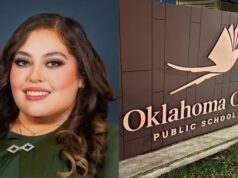
Working with English second language (ESL) students at Putnam City High as their graduation coach has been a roller coaster of emotions and contradictions. No two days have been the same, and each day has brought challenges.
As their coach, my general job description entails talking with parents, staff and administrators to reduce the dropout rate among the ESL population. The actual steps to meet this goal, however, involve more than just a simple phone call or sending an email. To many of these students, I am a counselor, a friend and a mentor. To me, these students are the future, and I help them the best I can.
Learning the English language, adapting to American culture and adjusting to a new school are three pieces of the American pie ESL students must navigate simultaneously upon arrival in this country. All of that that is on top of the extra baggage they bring with them.
Two kinds of immigrant students
Good or bad, most ESL students come to the United States by a decision that isn’t their own, each one with a different story about how they ended up in Oklahoma.
The lucky students are those who make it here from countries where their lives were in danger because of gangs, religious and political persecution or extreme poverty. The most privileged among the lucky ones are those who came into the country with some type of visa (an extremely difficult feat, as the line for visas continues to lengthen). With the right mentors, family support and a solid ESL program, these kids actually have a shot at realizing the American dream.
Meanwhile, the non-privileged students that come across the border, sometimes as unaccompanied minors, live in the shadows of fear as undocumented immigrants. They hide their status, live under circumstances they cannot control and claw their way toward the American dream one day at a time.
The story of Luis
Many new immigrant students face pressure to meet their school responsibilities while meeting responsibilities at home. Holding a job becomes an immediate need as a means for a family’s financial survival. Traveling to and from that job can be difficult.
To get a driving permit in Oklahoma, students must pass an eighth-grade level reading test, a tough feat for someone just learning a new language. Most of the time it takes a lot of hard work and a few tries. Undocumented students, however, are unable to get a license at all. These students will have to rely on someone else to take them to the odd jobs they can find. If there is no one to take them to work, they risk driving without a license and, if stopped by the police, may be fined, have their car impounded and, in the worst of cases, get arrested.
That’s what happened to Luis*, a former student of mine. Luis, a very bright student, crossed the border as an unaccompanied minor from Central America. He was caught driving without a license on several occasions, and he was eventually sent to court and deported. Once back in his country, he faced pressure to join a local and dangerous gang. Luis refused, and, as a result, he was tortured and killed.
Desperate times, desperate measures
There are many stories like Luis’ among immigrant, undocumented youth here in Oklahoma and all over the United States. The only place where these students can feel somewhat safe is at school. Once they leave at 3 p.m., however, they walk into an array of responsibilities and pressures that make them vulnerable to all kinds of abuse.
I just got back from Mexico. I have family there that are very hard worker and just want to work, but they struggle to make a living wage, especially in rural areas.
But honestly, it’s not even about just Mexico anymore. The illegal immigrants crossing the borders today are mostly from countries further south, such as Honduras, Guatemala and El Salvador. They are not coming to feed their families; they are coming to save them. Their lives are in grave danger, especially their children. You see, the gangs are so bad in these countries that innocent families often face two choices: Give your children to the gangs, or the gangs will kill you and your family. Faced with such a choice, would you not flee as well? And no, these desperate families cannot migrate “legally,” because if you are not middle class and relatively wealthy, you will never be approved for a visa. Ever.
Students from these families, like most American children, strive toward the pursuit of happiness. Unlike their peers, this pursuit leads down a bumpy road of struggles and dead ends. Reformed policies that meet the needs of undocumented immigrants are essential for giving all children the chance to have the quality of life that every human being deserves.
(Editor’s note: A name has been changed in this commentary to protect the identity of the author’s former student.)





















